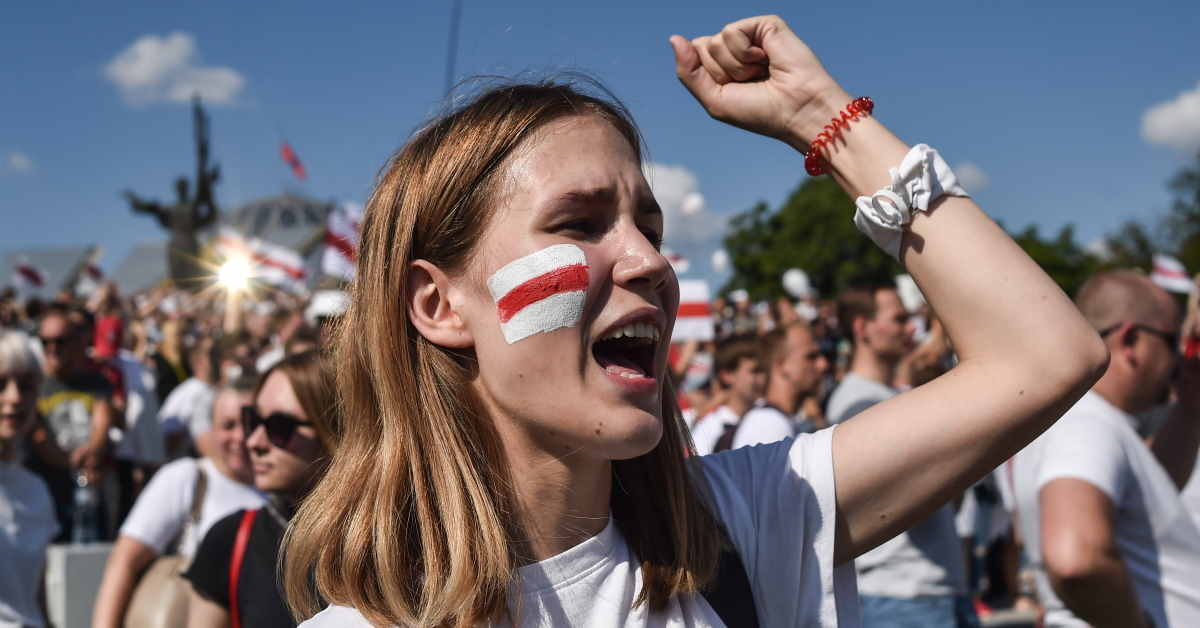Following a crushing re-election victory for Belarus President Alexander Lukashenko in disputed polls which led to anti-government protests seeking to oust him; here is a recap of a week of drama in the ex-Soviet country.
Vote Sparks Violence
On 9 August, 2020, Lukashenko, 65, who has ruled Belarus with an iron fist since 1994, runs for a sixth term in presidential elections.
His main rival is the 37-year-old political novice Svetlana Tikhanovskaya, who decided to run for president after her blogger husband Sergei Tikhanovsky was jailed and barred from contesting.
That night, an official exit poll declares Lukashenko the victor. Tikhanovskaya rejects the results.
Anti-government protests break out that are violently repressed by police, leading to some 3,000 arrests and dozens of injuries.
First Death
The next day, the first official results give victory to Lukashenko with 80 percent of votes, far ahead of Tikhanovskaya with 10 percent.
Tikhanovskaya claims victory and calls on Lukashenko to step down.
Russia, China and Venezuela welcome Lukashenko's re-election, but other countries and the European Union (EU) question the fairness of the vote and condemn the crackdown on protests.
For a second night, demonstrators clash with police in Minsk and other cities, leading to some 2,000 arrests.
One man dies when an explosive device goes off in his hand, police say, confirming the first fatality of the post-election protests.
Refuge In Lithuania
On 11 August a distressed-looking Tikhanovskaya says she has made a "difficult decision" to leave her country for Lithuania.
In Minsk, state media releases a video showing Tikhanovskaya urging supporters not to protest, but her allies say it was recorded under pressure.
Second Death
Fresh protests take place overnight, again harshly repressed. About 1,000 people are arrested.
The interior ministry on 12 August says police in the city of Brest used firearms against a group of protesters.
Several hundred women, many wearing white and holding flowers, join hands to form a human chain in central Minsk urging an end to police violence.
Officials confirm a second death in the unrest. They say a 25-year-old man died after he was detained on 9 August for taking part in illegal protests and sentenced to 10 days in prison.
On 13 August, after a fourth night of unrest, authorities say they have made 700 fresh arrests.
The human chain grows.
Russia accuses outside forces of attempting to destabilise Belarus.
Torture
Witness accounts of the torture of jailed protesters spread.
On 14 August, Tikhanovskaya calls for 'peaceful' protests in all cities at the weekend.
Workers in several factories walk off the job.
Lukashenko accuses Poland, the Netherlands, Ukraine and Russian opposition figures of being behind the protests.
At a meeting in Brussels the EU approves sanctions against those involved in the repression and electoral fraud.
Historic Demo
On 15 August, Lukashenko says that his Russian counterpart Vladimir Putin has promised to help maintain security.
On 16 August, tens of thousands of people gather in Minsk, in what is the biggest ever opposition rally in the history of the country.
Lukashenko rejects calls to organise a new election.
The authorities announce the liberation of more than 2,000 of the 6,700 people arrested up to 13 August.
Tikhanovskaya says in a video from exile in Lithuania she is ready to take over the country's leadership. The opposition calls a strike.
Britain, among others, says it does not accept the results of the election and intends to sanction those responsible for the repression.
The EU announces a summit for Wednesday. - AFP
